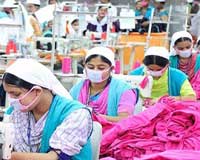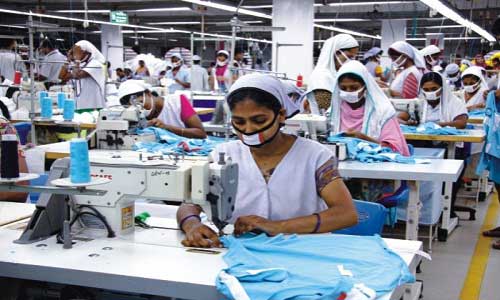FW
Inditex is gaining traction in Asia. According to the brand’s latest results, the region saw some of the group's biggest openings in the last financial year, and continues to be its second largest global market after Europe.
Last year, the continent accounted for almost a quarter of all global sales of the Spanish group. According to Inditex CEO Pablo Isla, the company plans to continue investing heavily in Asia. In 2012, Asia accounted for just 19 per cent of the retail giant’s revenue, rising to 23.9 per cent at the end of 2016. Meanwhile, other regions have remained relatively unchanged, except for Spain, which decreased its share from 20.7 per cent of all sales in 2012 to 16.9 per cent last year.
Over the last five years, Inditex has been particularly focused on growing both its physical store estate and expanding its online presence – a dual strategy that has been replicated across the Asian territory. In 2017, Zara opened an online store in India, joining the brand’s presence in Singapore, Malaysia, Thailand and Vietnam. But China is where the brand is most widespread, with a total of more than 620 stores.
Some 2017 milestones for Inditex included the opening of a 3,200-sq. mt. Zara flagship in Shenzhen, China; and similar launches in Mumbai, India; Nagoya, Japan; and Hanoi, Vietnam. Shenzhen also saw the opening of a Massimo Dutti flagship, while Bershka’s brand image was revamped in Tokyo. Meanwhile, Pull&Bear launched in Vietnam, where Pablo Isla eyes the launch of more brands following the arrival of Stradivarius in Ho Chi Minh, Massimo Dutti and Pull&Bear.
But for Inditex, Asia is not just an attractive retail market. The company has almost a thousand suppliers and more than 2,734 factories in the region, with Asian workers accounting for 10 per cent of the group’s total number of employees.
Swedish fashion giant H&M group is preparing for the launch of multi-brand e-commerce store focussing on fashion and discount fashion. The new project, called 'P12', could launch mid-April where around 60 brands have already been lined up to sell with the H&M group whose motto is ‘The Paradise for Style and Bargain hunting.’ As per reports suggest they have about 100 offices and an estimated investment of at approximately 50 million Euros.
The potential e-shop is expected to join the fast-fashion company's overall new digital strategy which it announced during its most recent and unhappy financial results where it said the group would close more H&M stores in 2018 and open less new stores than previously decided on. In spring, the group will also launch its H&M lines on Tmall, the mega Chinese e-commerce platform, while its upcoming brand, Nyden - a fashion brand targeted at millennials, will only be sold online and in limited flagship stores. For the fourth quarter 2017, H&M group sales fell by 4 per cent to 58.4 billion Danish kroner, over the fiscal period (6.1 billion Euros). For the entire year, total revenues rose by 4 per cent to 231.7 billion kroner, or 22.2 billion Euros.
Krichev and Bobruisk cities in Mogilev Oblast region of Belarus will get two new garment manufacturing factories during the first quarter of 2018. These two new units will be set up by Belarusian branch – Sharm Premyer of Russia-based knitted-goods manufacturer Sharm. The company will use the unused premises of rubber goods factory of the Belarusian tire maker Belshina for its factory in Krichev which will incorporate state-of-the-art equipment. Seamers are also being prepared and trained.
The second unit in Bobruisk may be housed in a rented building. These two manufacturing units is expected to create about 600 jobs and produce around 5,00,000 ready-made garments on a monthly basis, collectively. Goods manufactured here are to be exported to Russia from where it will be distributed through proprietary outlets.
Tatiana Andrushchishina, Director of Sharm Premyer says, favourable business terms, skilled workforce, good logistics and proximity to the Russian border made Mogilev Oblast as the obvious choice to set up these factories for the company.”
These two garment factories will manufacture products such as T-shirts, trousers, skirts, shorts, sweaters, breeches, polo shirts and tank tops to cater to the new millennials. Sharm Premyer has been manufacturing in Belarus since 2006 where their three manufacturing units produce around 2,50,000 garments every month.
There has been an exponential increase in LEED certified green factories in Bangladesh. The Alliance and the Accord have shown immensely positive results and the $50BN mark is closer to target. Bangladesh now exports $200MN apparel in terms of value. Year 2018 is expected to be a key year for this industry. The Alliance and the Accord will be leaving after their tenure is over and industry watchers will be keenly watching to see how factories in Bangladesh have managed to overhaul their operations.
Steps are already being taken to continue the progress the consortiums have made, with BGMEA planning to come up with their own plans. Key indicators for 2018 are: Enhanced Backward Linkage: Many government policies have permitted the textile industry to progress in the past few years. As a result of this, textile owners have started modernising their factories through newer machinery, better management practices and the implementation of new technology.
Better Infrastructure: The government has recently commissioned two studies to analyse the feasibility of a floating terminal and a mid-sized seaport, both near the Chittagong seaport to remove hurdles at the Chittagong seaport and enhance logistics. The government has already spent $6 billion this year alone and in recent years has undertaken the construction of a new seaport the Payra seaport, and the Padma bridge which is set to be completed by this year. So for 2018 looks bright for apparel buyers.
Go green initiative: The top three environmentally friendly garments factories in the world are located in Bangladesh. In a move to be more ethical and change the way, the world looks at Bangladesh, the RMG industry and Bangladesh apparel factory owners have initiated a move to be more eco-friendly. Currently 67 factories have obtained LEED certification and over 222 factories have been registered for the LEED certification process. The government has helped to promote this trend by providing loans at 9 per cent for apparel manufacturing factories that work towards being green.
AATCC, the world’s leading not-for-profit association serving textile professionals since 1921 — presents their 2018 International Conference (IC) to be held from March 6 to 8, Greenville, US and features a keynote presentation, educational tracks, a poster session, networking receptions and the Awards Luncheon, where their most prestigious awards will be presented.
Jerry Inman, Demand Worldwide, will provide the keynote presentation ‘The Retail Rebels: Who Will Conquer the Connected Consumer?’ where he will explore collaborating, communicating and connecting with next generation of shoppers and employees, Generation Z.
Three simultaneous educational tracks reflect the Association’s three Interest Groups: 1. Concept 2 Consumer® (C2C) which will focus on colour management and lighting trends for the evolving retail landscape, speed to market, sustainability throughout the supply chain, and textile testing.
2. Chemical Applications: This will address advances in colouration and chemistry, technologies to achieve comfort, odour control and antimicrobial, and the Herman and Myrtle Goldstein Student Paper Competition. 3. Materials Presentations will include advances in fibres and fabrics, flexible wearable technology, medical textiles, and comfort and performance clothing needs and assessments.
The conference, to be held at the Hyatt Regency in Greenville, is open to anyone.
The All Pakistan Textile Mills Association (APTMA) chairman, Amir Fayaz has urged the government to announce a long-term policy for the revival of the textile industry as announced by the Prime Minister in September and lay down its implementation. An early announcement will help reverse trade account deficit and add to the nation’s progress.
After the PM expressed his wish, the Federal Textile Board, in its follow up meeting with all stakeholders, had unanimously proposed various initiatives in this regard. The proposed policy is expected to raise the exportable surplus to $20 billion, develop a skill workforce of 0.7 million, achieve social standards and GSP plus prescriptions, generate new investment valued at $9 billion and revive backward and forward linkages in the supply chain, said Fayaz.
The policy would extend existing duty drawbacks for five years and increase drawbacks annually by 1 per cent for garments and made-ups, provide gas at an all-inclusive Rs 600/mmBTU to industry across the country, withdraw Rs 3.50/kWh surcharge on electricity and establish commercial enclaves in major cities with provision of rent-free space and other facilities to help foreign brands establish their buying houses.
The American Apparel & Footwear Association (AAFA) recently sent a letter to the Senate sponsors of the Outdoor Act demanding quick enactment to lower duties on outdoor apparel and support research programs for the industry. This legislation will help lower business costs for US companies that produce or sell recreational performance apparel.
Recreational performance outerwear is high-tech apparel specially designed for outdoor recreation in challenging conditions such as hiking, biking, skiing/snowboarding, hunting, fishing, mountaineering, and other recreational activities. High tariffs, some as high as 30 per cent, do not protect domestic industry and strangle product development and hamper growth, AAFA announced in a press release.
A 2007 study by the International Trade Commission found there was no commercially viable manufacturing of recreational performance outerwear in the US. The Outdoor Act will help make these products more affordable for companies to produce, encourage more Americans to get outdoors and power innovation.
"America holds the prime position for Bangladesh when it comes to textile exports but after the Rana Plaza tragedy, exports were greatly impacted. A look at the stats, in fiscal year 2016 reveals, $530.56 crore worth of RMG products were exported to the US and in 2015, $540 crore worth of clothing was exported from Bangladesh. As a result, the rate of garment export to US decreased 1.7 per cent in 2016. China is the top garment exporter to the United States. China exported $2,316 crore worth of clothing in the first 10 months of current year (2017). This export was 3.64 per cent less than the same period of previous year."

America holds the prime position for Bangladesh when it comes to textile exports but after the Rana Plaza tragedy, exports were greatly impacted. A look at the stats, in fiscal year 2016 reveals, $530.56 crore worth of RMG products were exported to the US and in 2015, $540 crore worth of clothing was exported from Bangladesh. As a result, the rate of garment export to US decreased 1.7 per cent in 2016. China is the top garment exporter to the United States. China exported $2,316 crore worth of clothing in the first 10 months of current year (2017). This export was 3.64 per cent less than the same period of previous year. Vietnam is the second largest exporter to the US.

The country exported clothing worth $984 crore and registered 6.79 per cent growth. Holding the next respective positions are Bangladesh, Indonesia and India. From January to October 31, 2017 Indonesia exported $393 crore and marked 2.81 percent negative growth. At the same time, India exported $321 crore achieving 2.6 percent growth. Bangladesh has exported US$ 435 crore worth of apparel items in the first 10 months of 2017 marking 4.93 per cent negative growth comparing to the same period of 2016.
Issues faced by Bangladesh
Besides lost faith owing to Rana Plaza incident, there are complexities of the Chittagong Port, which is increasing lead time. Besides, the industry people said some labour organizations and representatives of NGOs are spreading propaganda that Bangladesh does not have labour rights. President of Bangladesh Garment Manufacturers and Exporters Association (BGMEA) Md Siddiqur Rahman says the lack of efficiency in Bangladesh’s ports is largely responsible for the decline in earnings from the RMG export to the US.
During a recent meeting with US Ambassador to Bangladesh Marcia Stephens Bloom Bernicat, said that the great problem facing Bangladesh’s RMG sector lies with lead time. In today’s competitive markets, buyers want their goods delivered within a very short time. But manufacturers in Bangladesh require unreasonably longer lead time compared to other countries. As a result, exports to the US have declined. In order to reduce the lead time, it was necessary to improve the efficiency in the ports to make sure products are delivered on time. Additionally, there is a need to establish more textile mills to meet the local demands to reduce the lead time.
US Ambassador Marcia Bernicat also emphasised on enhancing the capacity of the country’s existing ports. If Bangladesh does not make the ports more efficient, it will fall behind other competitors. The RMG sector would remain an important part of Bangladesh’s economy for years to come, it is a crucial period for the sector for which the US wants to work together as a partner of Bangladesh to make sure the industry is strong and that both labour rights and safety of RMG workers are ensured.
The year 2017 proved to be very fruitful for Uzbekistan textile industry as they managed to notch up $1.1 billion worth exports. Uzbekistan’s export basket covered over 50 countries and a significant portion of their textile exports fell under the value-added products category. In fact, the value-added products accounted for 40 per cent of the total exports.
The phenomenal export growth was attributed to the proactive measures adopted by 64 trading houses that were set up on foreign soils. The figures were provided by Association of Textile and Clothing and Textile Industries Enterprises (Uztekstilprom).
In 2017 alone, the number of textile exporting units rose steeply from 293 to 350 before the year-end. The annual production of happened to be 1.4 million tonnes. Nearly, 60 per cent of this produce caters to domestic consumption. In all, the country witnessed the swinging into action of 34 investment projects for purposes of modernizing existing units and founding of new units. This enabled Uzbekistan to create an export potential of $151.7 million. The aggregate value of export potential as of 2017 stood at $356 million.
Industry experts in the country along with help from the ministry have drawn out a draft proposal for development. The draft plan envisages a medium-term perspective for cotton textile clusters. The experts were able to draw from the rich experience of existing clusters in Navoi region of Uzbekistan. The cotton industry in Uzbekistan is facing a boom with 7000 industrial units operating in the country which are mainly handling natural fibers like cotton, wool and silk.
The government in collaboration with industry plans to create 112 modern high –tech factories. In addition, the plan envisages expansion, modernization and technological upgrade of 20 of its operating capacities. The plan once set into motion will yield an export surge of nearly $2.5 billion per year besides creating 25,000 new jobs.
Apparel Resources’ forecasts the US will significantly improve apparel imports in 2017, in terms of volumes. The country may record a 1.04 per cent rise in volume terms during the January to December 2017 period. The largest apparel importer in the world may import 27,164.17 million SME of apparels during the review period when compared to 26,927 million SME in the prior-year period. In addition, the US is likely to put a hold on rising import values in 2017 and note a 0.68 per cent decline on Y-o-Y basis. The UVR for the said period is estimated to be US $ 2.95 as against US $ 3.00 in the same period of 2016.
China’s a leader as the apparel powerhouse to the US is expected to see a drop from January to October period, China recorded a surge in volume of exports by 1.93 per cent; however, the country dropped the unit prices of apparel to enable it to stay competitive in international markets. Apparel Resources’ predictions indicate China’s export of apparels to the US valued at $27.04 billion would drop by 3.14 per cent on the Y-o-Y basis in December 2017. India and Vietnam, on the other hand, are likely to gain in both volume and value terms to the US during January to December 2017 period. Vietnam is set to record $11.43 billion (up by 5.79 per cent) from its apparel exports in the year 2017 ending 31st December.
India is expected to see a marginal rise of 1.79 per cent (with an export value of $3.70 billion in 2017 as against $3.64 billion in 2016) in its apparel exports value to the US. Through 2017, Bangladesh’ apparel exporters faced many challenges such as the fluctuation in the currency value (appreciation of Taka against US dollar), longer shipping time, the rise in production cost and safety issues which pushed the country towards the declining trend in the US clothing market.












